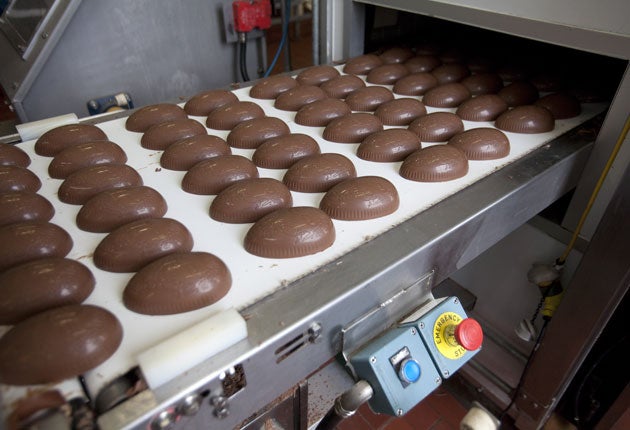The eggs roll by, but life at Bournville has a darker side
A Slice of Britain: New owner Kraft won't guarantee long-term jobs, so Cadbury workers fear this is their final Easter

The air is heavy with the smell of molten chocolate. A rhythmic hiss of pistons is the backdrop to a conveyor belt clattering behind a heavy, closed door. This is room U5, at the top of the Bournville factory, near Birmingham, where Cadbury churns out millions of chocolate eggs every year.
Blobs of brown semi-liquid squelch into rows of concave trays. They are tipped upside-down on a conveyer, hit with hammers, forcing out the contents. It is the last full day of production, the last ovoids rolling off the production line for Easter. Soon the line will be silent.
Somehow the shutting down of the egg line seems more significant, ominous even, than in previous years. Since the processed-cheese conglomerate Kraft took over Cadbury last year, Bournville's workers have been holding their breath. The American multinational has been blunt: it cannot guarantee jobs after March 2012. Its British employees fear this could be their last Easter at the chocolate firm for whom many have worked all their lives.
Their boss now is Irene Rosenfeld, who has little in common with the benevolent Quaker George Cadbury, who opened Bournville – the factory and its surrounding houses for workers – in 1879. Rosenfeld's approach to business is more straightforward: the iron-fisted CEO of Kraft got a 40 per cent pay rise last year for pulling off one of the most aggressive takeovers in British history.
One of the workers she acquired, Victor Fulford, 53, keeps his eye on the flowing machinery. After 36 years at Cadbury he's acutely aware of the change his new boss has brought.
"It's been a busy year. We just hope the sales are alright, but we never know. There's more pressure on us now to get more eggs out. They want everything to get faster and faster. They've got six robots now where we used to have six people, and they have one person running it."
British chocolate lovers eat 80 million Easter eggs every year; around half of these are made by Cadbury. The company's normal share of the chocolate market – less than a third – soars to 50 per cent at Easter.
The annual surge in production meant Cadbury had to ask for extra effort from its workers. The arrival of Kraft has pushed them further still.
Carole Green, 60, looks flustered as she stacks yellow boxes for the eggs. "We've had a few stops and starts with machines playing up today. When I first started here, after I left school, it was a very different place to work. There wasn't so much pressure. There's a lot of pressure at the moment. Then, this room was full of women doing it by hand, so that's changed. It's a mad job now."
Kraft boasts that Carole and Victor work on "the most efficient Easter egg line in the world". But at a price.
Relentless lines of shiny purple-wrapped eggs climb a conveyor then whizz off along a high track to the other side of the room for packing, while robotic arms place chocolate shells on top of one another at dizzying speed.
These are the large shell eggs which will be packaged with bags of mini eggs. For years the bags of small, individually wrapped treats were made at the factory in Somerdale near Bristol. But after the Kraft takeover it was closed amid fury last year. Now the mini eggs are shipped in from Poland.
Wayne Hunt, 41, a heavy-set man who looks out of place crammed between his hairnet and a small stool, is throwing purple eggs into crates. Until recently he worked in the warehouse at Somerdale. He has been transferred. "I started my job on the lorries," he says. "I think if I did this for too long I'd go mad. I'm sick of seeing eggs now. They're everywhere. I don't think I'll eat any now. My kids might, but I'd rather not.
"I've been here for three months: I just moved from Somerdale, where I worked for 15 years, and I'm in the process of selling my house and moving. As an employer, Cadbury's were very good, excellent. As for Kraft, I don't know. We'll soon find out."
Outside, away from the machines, are relentless reminders of George Cadbury's attempt to create the ideal living and working environment. The idyllic surroundings are a world away from the factory's relentless robots and apprehensive staff.
Gary Davies, 54, leans against the factory wall having a cigarette. "I was 16 when I started here. Not a lot has changed yet; it's what happens in March that people are worried about."
"Yeah, it's job security that's the big concern," chips in Roger Griffin, 44. The men both work on the production line producing Roses and they fear the future. "Cadbury used to look after family but they don't do that now. Now it's all about temps."
Like many, the men feel loyal to the old Cadbury: to the idea that, while they worked for a firm, they were part of a family. They miss a sense of unity and history and they don't care much if their new, American masters know it. Stubbing out his cigarette, Griffin manages to both mutter yet speak out for all: "Kraft can't gag us."
Join our commenting forum
Join thought-provoking conversations, follow other Independent readers and see their replies
Comments